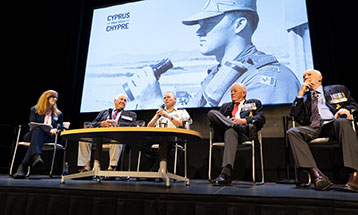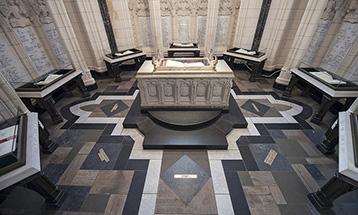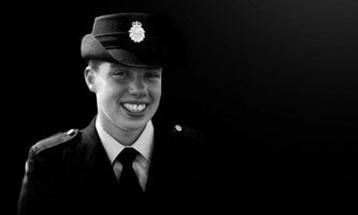
24 September 2024 – Minister of Veterans Affairs, Ginette Petitpas Taylor and Lieutenant General (Retired) Marc Caron viewing the Canadian War Museum’s exhibit: Cyprus – A Divided Island.
On 12 March, 1964, Prime Minister Lester B. Pearson committed a contingent of Canadian Troops to the United Nations Peacekeeping Force in Cyprus (UNFICYP). The contingent began deploying the next day. This peacekeeping operation turned out to be one of Canada’s longest military efforts abroad.
Sixty years after the first deployment, at the Canadian War Museum’s opening of Cyprus – A Divided Island exhibit, four Canadian veterans recounted their experiences and the impact of Canada’s peacekeeping role in Cyprus.
The Deployment
Major General (Retired) Clive Milner was among the first to deploy to Cyprus in 1964. The following year, he raised the then new Canadian flag in Nicosia, the capital of Cyprus.
Major General Milner: “We didn’t fully expect or realize what it was we were getting into. [When] we arrived, we were immediately given tasks to provide reconnaissance for intelligence gathering and to show the UN flag. Let's face it, the majority of the Cypriots had not heard of the UN, let alone seen the flag or the blue beret, so we had a lot of educating to do for the people in Cyprus.”
Lieutenant General (Retired) Marc Caron's first overseas mission was to Cyprus with the Canadian Airborne Regiment in 1974 – a pivotal time in the peacekeeping mission.

Lieutenant General (Retired) Marc Caron.
Lieutenant General Caron: “From April to July 1974, it was normal, as usual. By that time, UNFICYP, the UN forces in Cyprus, had gone through a number of drawdowns… an indication that people believed that it was a quiet place, and we were on our way to success there. But on the 15th of July, all things broke down. It was a coup d'état where Greek officers… wanted to kill the president. He managed to get away with the help of the British Forces and then, of course, the Turkish side was not going to let that go by. And, on the 20th of July, they invaded.”
Chief Warrant Officer (Retired) Terence Hurley served on three tours of duty in Cyprus beginning in 1976.
Chief Warrant Officer Hurley: “Because the war in ’74 was still fresh in everybody’s mind when we went in ‘76, we went there with the purpose of ‘the trained soldier,’ not ‘the peacekeeper.’ Although we were still peacekeepers, we had the mentality that we were going to be ready in the event of [conflict]. So, throughout the whole ‘76 tour, we were alert, we were vigilant, we took everything very seriously, and did our jobs.”
Lieutenant Colonel David Jones’s first posting was in the Royal Marine Commando Brigade, which included a tour in Cyprus in 1995.
Lieutenant Colonel Jones: “I took over what had been a large part of the Canadian area in ‘95. [The Canadians] left in ’93… so there was still a lot of evidence of Canadian presence because it had been so enduring.”
The Operation
Once the peacekeeping force arrived in 1964, the situation was unlike anything that UN peacekeepers had previously experienced.
Major General Milner: “We thought that we’d be there for the most six months. The mandate was only three months. Eventually, we realized that it was going to be a little longer.”

Moderator Karen Storwick, Major General (Retired) Clive Milner (speaking) and Lieutenant Colonel David Jones.
The quarrelling populations of Turks and Greeks were very intermingled on the island and the UN troops were faced with maintaining the peace in a situation where many small groups of Turks lived among the larger Greek population.
Lieutenant Colonel Jones: “We lived in the buffer zone… between the Turkish and the Greeks… and they would shout at each other all night. Sometimes shots would get discharged. I've got no evidence of anyone ever being hit by a projectile from one or the other side. But they just did it to be nuisances.”
Chief Warrant Officer Hurley: “One of the things I think, and it's only my own personal opinion, it seemed that every time Canada was ready to pull out of Cyprus throughout the years, there was a little escalation by either side to keep us there.”
Canadian soldiers needed both their traditional skills of soldiering and the skills of managing disagreements and conflicts between civilians.
Major General Milner: “It was an interesting time… I had to practice some things that I had never really put much effort into, like diplomacy. I thought we were there to protect democracy, not practice it. But I had to practice it, as did some of the people right down at the lowest levels. The corporals, and the sergeants, and the warrants, and the young officers – they were actually, in fact, diplomatic missionaries from their nations. They wore the UN flag on one side and their national flag on another.”
The Legacy
To one degree or another, bravery and heroism were integral parts of the efforts of all the Canadians in Cyprus over the years.
Lieutenant Colonel Jones: “The Canadian presence is enduring… There is Beaver Lodge, Maple House. There is lots of evidence of Canadian presence still and that's beloved by the Cypriot people. They remember the Canadians, their contribution to their peace, in a very, very fond way. Even though it's a long time ago, it's still very evident.”
The invasion of 1974 saw fierce fighting with thousands of Turkish soldiers landing in Cyprus in just the first 24 hours.

Left to right, Lieutenant Colonel David Jones and Chief Warrant Officer (Retired) Terence Hurley.
Lieutenant General Caron: “I think we can take credit for Nicosia… Just put yourself back in those days; bombing going on, people trying to get out of the island and they could not. But, we reassured them. We got them out… I think that was an important event. And, serving for 60 years, that's an important legacy.”
Lieutenant Colonel Jones: “Canada had the most critical part of the mission… The problems in Nicosia are complex and challenging. And so, Canada was trusted to do that part of the mission because it could do it very well. And, that's been borne out by all the service of great Canadians.”
It has been remarked of difficult situations like these that "Peacekeeping is not a soldier's job, but only a soldier can do it."
Major General Milner: “I think the war in ‘74 cemented the relationship with the UN. People realized that… there was a real role for the United Nations. We were well received then; I think we are still today. Nice to see the Canadian flag still flying in Nicosia.”




